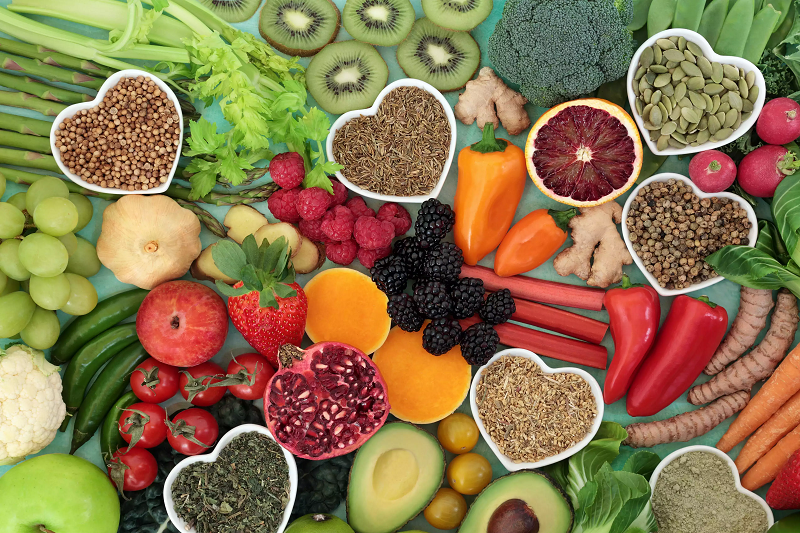
Vegan Diets Lower Cholesterol And Benefit The Heart, New Study Suggests
So you’ve been hearing a lot lately about how vegan diets are better for your heart health and cholesterol levels. Turns out the rumors are true, according to a new study published in the Journal of the American Heart Association. Researchers found that people who followed a vegan diet for six months significantly lowered their cholesterol levels compared to people following a standard American diet. We’re talking about double-digit drops in both LDL (the “bad” cholesterol) and total cholesterol.
The study looked at over 100 participants with high cholesterol who were randomly assigned to follow either a low-fat vegan diet or continue with their usual diet. After just six months, the vegan group saw their LDL cholesterol drop an average of 13 points and total cholesterol drops an average of 15 points. The control group’s numbers essentially stayed the same. While six months may not seem like a long time, those kinds of results speak for themselves. Eating a diet free of animal products and high in fruits, vegetables, grains, and legumes can have a powerful impact on your heart health, even in a relatively short period.
Vegan Diets Significantly Reduce Cholesterol Levels
If you go vegan, you’ll likely see your cholesterol levels drop significantly. According to a new study, vegan diets can lower cholesterol by up to 35% compared to non-vegan diets.
For the study, researchers analyzed blood samples from over 2,000 vegans and compared them to non-vegans. Vegans had much lower levels of LDL or “bad” cholesterol and higher levels of heart-healthy HDL cholesterol. The vegans also had lower triglyceride levels, which can raise the risk of heart disease.
- Eating more plant-based foods like fruits, vegetables, grains, and legumes
- Avoiding cholesterol-raising animal products like meat, eggs, and dairy
By following a vegan diet, you remove these cholesterol-spiking foods from your plate and replace them with heart-healthy plant foods. It’s really that simple. A vegan diet high in fiber-rich whole foods is one of the most effective ways to lower your cholesterol and support heart health.
Some tips to get started:
•Focus on leafy green veggies, beans, lentils, nuts, and seeds. These powerhouse plants are loaded with protein, fiber, and healthy fats.
•Learn easy vegan swaps for your favorite dishes. Try veggie burgers instead of beef, nut-based cheeses instead of dairy cheese, and plant milk instead of cow’s milk.
•Do some meal prep on the weekends to make vegan eating convenient during the week. Cook a big pot of chili or curry, roast some veggies, and make a batch of granola.
•Don’t be afraid to ask for vegan options when eating out. Many restaurants now offer delicious vegan choices, so you can stick to a vegan diet even when you’re not cooking at home.
Going vegan may require an adjustment, but the rewards to your health and the planet are well worth it. Lower your cholesterol and open your heart to compassionate eating. Your body and the animals will thank you!
A Vegan Diet Improves Cardiovascular Health
Switching to a vegan diet can have major benefits for your heart health. According to a new study, vegans tend to have lower cholesterol levels and less risk of heart disease. A vegan diet has significant benefits for your cardiovascular system and overall heart health. Making the switch to a plant-based diet could help add years to your life and life to your years. Your heart will thank you!
Keep Reading
The Vegan Diet: Naturally Free of Saturated Fat and Cholesterol
A vegan diet is naturally cholesterol-free and low in saturated fat. By avoiding all animal products, you eliminate dietary cholesterol and the most saturated fat from your meals.
No Meat, No Dairy, No Problem
Vegetarians do not eat any meat, poultry, or seafood. You also avoid dairy products like milk, cheese, butter, and eggs. Instead, you focus on plant-based sources of protein such as:
- Beans, lentils, and legumes
- Tofu and tempeh
- Seitan (made from wheat gluten)
- Nut kinds of butter like peanut butter and almond butter
Healthy Fats
While saturated fat and cholesterol are out, you still need fats in your diet. Get healthy fats from:
- Nuts like almonds, walnuts, and cashews
- Seeds such as chia, flax, and hemp
- Avocados – mash them on toast or in salads
- Coconut oil – use for cooking and baking
- Olive oil – for salad dressings, sauteing, and drizzling
These fats are high in heart-healthy monounsaturated and omega-3 fatty acids which can help lower “bad” LDL cholesterol and raise “good” HDL cholesterol.
Fiber-Filled Foods
A vegan diet is also naturally high in fiber since it’s plant-based. Fiber helps lower cholesterol and keeps you feeling full. Stock up on high-fiber foods like:
- Oatmeal – have a bowl for breakfast
- Beans and lentils
- Berries
- Broccoli and Brussels sprouts
- Whole grains like brown rice, quinoa, and farro
By following a well-planned vegan diet with little or no saturated fat and cholesterol, you can achieve and maintain healthy cholesterol levels and benefit your heart in the process. A vegan diet may be just what the doctor ordered.
A Vegan Diet Provides Heart-Healthy Nutrients
A vegan diet can significantly lower your cholesterol levels and improve your heart health. By eliminating all animal products, vegans consume little to no cholesterol and more heart-healthy nutrients.
Fiber
A vegan diet is high in fiber, which helps lower cholesterol. Fiber binds to cholesterol in the gut and prevents it from being absorbed into the bloodstream. Aim for 25 to 30 grams of fiber per day from foods like beans, broccoli, oats, and nuts.
Plant sterols
Plant sterols are compounds found in plant-based foods that help block cholesterol absorption. Consuming 2 grams of plant sterols per day can lower LDL or “bad” cholesterol by up to 10 percent. Find plant sterols in foods such as vegetable oils, nuts, and seeds.
Healthy fats
While vegans avoid saturated fat from animal products, a vegan diet provides healthy unsaturated fats. Monounsaturated fats from olive oil, nuts, and avocados and omega-3 fatty acids from chia seeds, flax seeds, and walnuts help lower inflammation and raise good HDL cholesterol.
Phytochemicals
A vegan diet is rich in phytochemicals, plant compounds that may help reduce plaque buildup in arteries and lower heart disease risk. Resveratrol in red wine, lycopene in tomatoes, and quercetin in apples and onions are just a few examples of heart-healthy phytochemicals found in plant foods.
By following a balanced vegan diet with many whole plant foods, you’ll get all the cholesterol-lowering and heart-protective benefits. Your heart and body will thank you. Keep exploring all the delicious and nutritious vegan options available and you’ll be well on your way to better heart health.
FAQ: How Can I Start a Vegan Diet?
So you want to give a vegan diet a try? That’s great news for your health and the planet. Here are some tips to get started:
Eliminate animal products
The core of a vegan diet is avoiding all animal products, including meat, seafood, eggs, dairy, and honey. Check ingredient labels and avoid foods with ingredients like whey, casein, albumin, and gelatin.
Focus on plant-based foods
Fill your plate with whole foods like fruits and vegetables, grains, beans, legumes, nuts, and seeds. Some options include:
- Rice, quinoa, oats, and whole-grain bread
- Lentils, chickpeas, black beans, and edamame
- Broccoli, spinach, carrots, and sweet potatoes
- Almonds, walnuts, chia seeds, and flax seeds
Supplement when needed
You may need to supplement nutrients like vitamin B12, calcium, iron, zinc, and omega-3 fatty acids. Talk to your doctor about whether supplements are right for you.
Discover new recipes
Search online for vegan recipes and meal ideas. Some cuisines like Indian, Thai, and Mexican have many naturally vegan dishes. You can also organize old favorites by swapping in plant-based ingredients.
Make it sustainable
A vegan diet can be healthy when done right. Focus on whole foods, eat a variety of nutrients, and maintain a balanced diet. Staying well-hydrated and exercising regularly also helps. If you have any concerns, consult a registered dietitian.
Transitioning to a vegan diet may take some adjustment, but the benefits to your health and the environment can be well worth it. Start slowly by adding more plant-based meals each week and build up from there. With all the delicious vegan foods and recipes to try, you’ll be thriving in no time!
Conclusion
So there you have it, more evidence that going meat-free can be good for your heart. A vegan diet full of fruits, vegetables, grains, and legumes may help lower your cholesterol and reduce your risk of heart disease. While transitioning to a fully plant-based diet isn’t for everyone, adding more plant-based meals each week could still benefit your health. Every little bit helps, so try meatless Mondays or make one vegan meal each day. Your heart will thank you, and you might find some new favorite foods along the way. A healthy diet and lifestyle are the best gifts you can give yourself, so take this study as inspiration to eat more plants and live well. Your future self will appreciate the investment in your health and well-being today.




